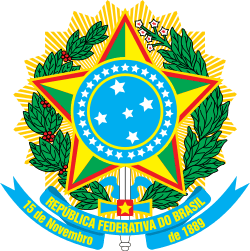Brazil–India relations
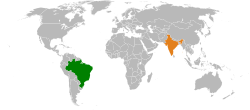 |
|
Brazil |
India |
|---|---|
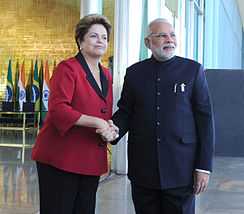
Brazil–India relations refers to the bilateral relations between the Federative Republic of Brazil and the Republic of India.
Brazil and India also share historical ties as a result of the Portuguese Empire. More recently, Brazil and India have co-operated in the multilateral level on issues such as international trade and development, environment, reform of the UN and the UNSC expansion.[1]
Country comparison
| |
| |
|---|---|---|
| Population | 190,732,694 | 1,210,193,422 |
| Area | 8,514,877 km² (3,287,597 sq. mi) | 3,287,240 km² (1,269,210 sq. mi) |
| Population Density | 22/km² (57/sq. mi) | 364/km² (943/sq. mi) |
| Capital | Brasília | New Delhi |
| Largest City | São Paulo - 11,037,593 (19,889,559 Metro) | New Delhi- 21,372,000 (25,455,000) |
| Government | Federal presidential constitutional republic | Federal parliamentary constitutional republic |
| Official languages | Portuguese | Hindi, English and 20 other officially recognised languages. see: Official Languages of India |
| Main religions | 74% Roman Catholicism, 15.4% Protestant, 7.4% non-Religious, 1.3% Kardecist spiritism, 1.7% Other religions, 0.3% Afro-Brazilian religions |
80.5% Hinduism, 13.4% Islam, 2.3% Christianity, 1.9% Sikhism, 0.8% Buddhism, 0.4% Jainism, 1.2% other religions |
| GDP (nominal) | US$2.425 trillion ($12,200 per capita) | US$1.946 trillion ($1,542 per capita)[2] |
| GDP (PPP) | US$2.309 trillion ($11,845 per capita) | US$4.710 trillion ($3,851 per capita)[3] |
| Military expenditures | $31.576 billion (FY 2012)[4] | $46.219 billion (FY 2012) |
History

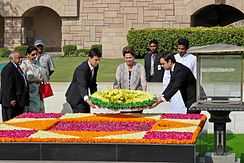
India’s links with Brazil go back five centuries. Portugal’s Pedro Alvares Cabral is officially recognised as the first European to “discover” Brazil in 1500. Cabral was sent to India by the King of Portugal after the return of Vasco da Gama from his pioneering journey to India. Cabral is reported to have been blown-off course on his way to India. Brazil became an important Portuguese colony and stop-over in the long journey to Goa. This Portuguese connexion led to the exchange of several agricultural crops between India and Brazil in the colonial days. Indian cattle was also imported to Brazil. Most of the cattle in Brazil is of Indian origin.
Diplomatic relations between India and Brazil were established in 1948. The Indian Embassy opened in Rio de Janeiro on May 3, 1948, moving to Brasília on August 1, 1971.
One of the major sources of tension between the two nations was the decolonisation process of the Portuguese enclaves in India, principally Goa. Despite pressure from India on Portugal to retreat from the subcontinent, Brazil supported Portugal’s claim for Goa. Brazil only changed course in 1961, when it became increasingly clear that India would succeed is taking control of Goa by force from an increasingly feeble Portugal, which faced too many internal problems to pose a potent military threat to India. Still, when Nehru’s armies overwhelmed Portuguese resistance and occupied Goa, the Brazilian government criticised India sharply for violating international law. While Brazil tried to explain to India that its position was to be understood in the context of a long tradition of friendship between Brazil and Portugal, the Indian government was deeply disappointed that Brazil, a democratic and a former colony, would support a non-democratic Portugal against democratic and recently independent India.[5]
During the Portuguese Empire, chillis were traded from the New World to India and cows were sent the other way, amongst other trades.
Cultural relations
A successful Festival of India was organised during the visit of President K.R. Narayanan to Brazil in May 1998. There is also a presence of ISKCON, Satya Sai Baba, Maharishi Mahesh Yogi, Bhakti Vedanta Foundation and other Indian spiritual gurus and organisations have chapters in Brazil.
A statue of Mohandas Gandhi is located near the Parque Iberapuera at São Paulo and another statue is also at Rio de Janeiro. A group called the Filhos de Gandhi (Sons of Gandhi) participates regularly in the carnival in Salvador. Private Brazilian organisations occasionally invite Indian cultural troupes.
Caminho das Índias, a popular telenovela in Brazil aired in 2009, popularised Indian culture in Brazil. Books about India started to pop up on the best-selling list, the number of travels to India by Brazilians tourists increased dramatically and restaurants and even nightclubs with Indian themes starting to open.
Economic relations
In recent years, relations between Brazil and India have grown considerably and co-operation between the two countries has been extended to such diverse areas as science and technology, pharmaceuticals and space. The two-way trade in 2007 nearly tripled to US$ 3.12 billion from US$ 1.2 billion in 2004.[6]
Global software giant, Wipro Technologies, also set up a business process outsourcing centre in Curitiba to provide shared services to AmBev, the largest brewery in Latin America. AmBev's zonal vice president, Renato Nahas Batista, said "We are honoured to be a part of Wipro's expansion plans in Brazil and Latin America." AmBev's portfolio includes leading brands like Brahma, Becks, Stella and Antarctica.
21st century relations
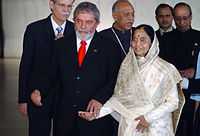
UNSC reform
Both countries want the participation of developing countries in the UNSC permanent membership since the underlying philosophy for both of them are: UNSC should be more democratic, legitimate and representative - the G4 is a novel grouping for this realisation.[8]
South-South cooperation
Brazil and India are involved in the IBSA initiative.
The first ever IBSA Summit was held in Brasília in September 2006, followed by the Second IBSA Summit held in Pretoria in October 2007, with the third one held in New Delhi in October 2008. The fourth IBSA meet was again hosted in Brasília, just before the second BRIC summit. Four IBSA Trilateral Commission meetings were already held till 2007 since the first one was held in 2004 and had covered many areas such as science, technology, education, agriculture, energy, culture, health, social issues, public administration and revenue administration. The target of US$10 billion in trade was already achieved by 2007.
Both countries view this as a tool of transformation diplomacy to bring economic growth, sustainable development, poverty reduction and regional prosperity in the vast regions of Latin America, Africa and Asia. The IBSA Fund for Alleviation of Poverty and Hunger has already provided funds for capacity building in East Timor and for the fight against HIV/AIDS in Burundi and has won the South-South Partnership Award at the 2006 UN Day event held in New York City on 19 December 2006.[9]
References
- ↑ Indian Embassy in Brazil: Bilateral Relations
- ↑ Economy of india
- ↑ Economy of india
- ↑ National Congress of Brazil. Brazilian Federal Budget (2009) - Ministry of Defense (Ministério da Defesa).
- ↑ Stuenkel, Oliver. "The Case for Stronger Brazil-India Relations", 'The Indian Foreign Affairs Journal' July–September 2010
- ↑ Indian Embassy in Brazil: Bilateral Trade Statistics
- ↑ http://www.hindu.com/2008/10/16/stories/2008101659291200.htm
- ↑ von Freiesleben, Jonas."Member States Discuss Security Council Reform Again: A Never-Ending Process?" Centre for UN Reform, April 16, 2008, retrieved October 31, 2010
- ↑ Consulate of India: Brazil & India bilateral relations
External links
| Wikimedia Commons has media related to Relations of Brazil and India. |
- Embassy of Brazil in India
- Embassy of India in Brazil
- IBSA Trilateral India, Brazil South Africa Forum
| |||||||||||||||||||||||||||||||||||||||||||||||
| ||||||||||||||||||||||||||||||||||||||||||||||||||||||||||||||||||||||||
| ||||||||||||||||||||||||||||
